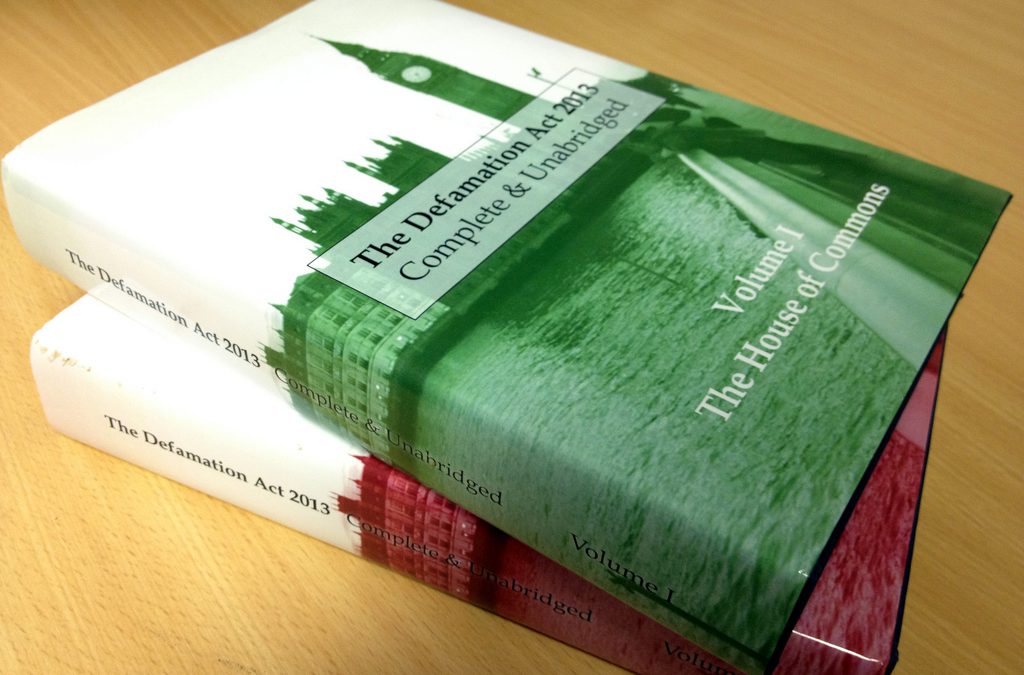
How Does the EU Affect Our Everyday Life?
July 31, 2013
Top 5 Legal TV Shows for the Student Lawyer
August 31, 2013Defamation has been a longstanding staple in the law of torts in the UK. Before the royal assent of the Defamation Act 2013 in April, the law was governed mainly by the Defamation Acts of 1952 and 1996. The introduction of the new act has brought about many changes to the way defamation law is handled in the UK, and this article will serve to clarify some of these changes and their subsequent impact.
What has changed?
Originally, the burden of proof for defamation was to show that the public’s estimation of the claimant would be lowered as a result of the comment. Under the 2013 Act, the claimant must now also prove that the defamatory comments caused harm or are likely to cause harm. Further, corporate bodies must prove that the defamatory comments have led to, or are likely to lead to, financial losses.
Originally, the burden of proof for defamation was to show that the public’s estimation of the claimant would be lowered as a result of the comment.
Secondly, the Act now accommodates operators of websites. It allows claimants to handle issues directly with those who make the defamatory comments, provided that the website operator abides by the regulations.
A major development in defamation law in the UK has been the change in the defences available to those who are claimed against. The old defence of ‘qualified privilege’ (more commonly known as the ‘Reynolds defence’) has been replaced with ‘publication on matters of public interest.’ This is a codification of the Reynolds defence, which was previously used as a precedent in this area. The defence sought to protect those who published allegations, even though they may be false, by arguing that they had the right to do so. Further, the defences of ‘justification’ and ‘fair comment’ have been replaced with ‘truth’ and ‘honest opinion’.
Another major change in the law of defamation concerns tortfeasors who do not reside in the UK, an EU member state or a state which is part of the Lugano Convention. The change means that the UK court does not have to hear any case unless it can be proved that the UK would be the most appropriate forum to handle the action against the tortfeasor.
A ‘single publication rule’ has also been established, which accommodates the prevalence of online news stories. Under this rule, a one year limitation commences when a story is published. Every time the story is repeated or viewed, a separate action cannot be brought about by the claimant against the publisher.
What is the impact of this change?
Proving that the claimant suffered or is likely to suffer serious harm as a result of the comments has restricted the scope of potential claims. This will inevitably lead to fewer cases being brought to courts as it would be more difficult to prove this. As well as this, companies have to show that they suffered financial loss, which must be proved with concrete evidence in order to justify their claim. However, as it is more difficult to succeed without financial loss, members of the company may choose to make personal claims against the tortfeasors. For example, the CEO of a company may claim that the defamatory comments against the company caused serious harm to him. This would be in order to avoid proving serious the financial loss of the company. The new change also has a positive effect for the publications as they could have more liberty in publishing comments about companies without the threat of being sued.
The new law regarding operators of websites is positive as it is updated to suit the current state of the internet. The law also allows for increased protection of the website operator if they did not make the comments in relation to the case.
By restricting the court’s jurisdiction to fewer states, the court is able to decrease the amount of claims which would be brought forward. The new law prevents claims which do not have much relation to the UK from being settled here, unless the claimant can prove that the UK is the best forum to settle the case. London has often been cited as the ‘claim capital of the world’ and it is possible that this change will remedy that stigma.
The three defences which are included in the Defamation Act 2013 serve to codify and simplify the pre-existent defences.
The introduction of the ‘one year’ rule also means that there will be fewer cases brought forward. As well as this, claimants will need to be shrewd about which claim they bring forward, under the limit of one year. The positive effect of this change is that the Act has been updated to suit online behaviour. Under the old law, a new actionable claim could be opened for every time the same defamatory comment was republished, which could lead to a long set of cases that would be time-consuming for the court and the claimant.
The three defences which are included in the Defamation Act 2013 serve to codify and simplify the pre-existing defences. The new defence of ‘truth’ must be proved with evidence that the defamatory comments were indeed correct. The defence of ‘matters of public interest’ is somewhat easier to use for publishers as they only need to prove that they thought it was reasonable to publish the comments in the matter of public interest. There is no additional burden of proof required, unlike in the previous Reynolds defence.
Are there things still left to be changed?
Despite the radical change in the tort of defamation, there are still some key areas which require reform.
Proving financial loss for corporate bodies may be difficult as it is not yet clear which evidence the company would need to provide. Further, if a company provided evidence of financial loss, then it may not be clear whether the financial loss was caused by the defamatory publication or by another extraneous cause.
Although the law regarding non-domiciled tortfeasors has been changed, the law is yet to deal with the issue of non-UK claimants. One example of this could be US citizens who make a claim against a British publication for making defamatory comments. Although it is correct for a UK court to deal with defamatory comments made by a UK company, there may be some arguments against this, for example, concerning the amount of cases brought forward and whether non-UK claimants would be able to use UK law.
Faizan is currently in his second year at the University of Warwick. His interests include family and child law, criminal law and commercial law.





